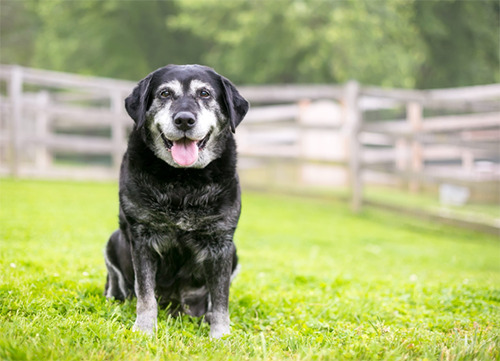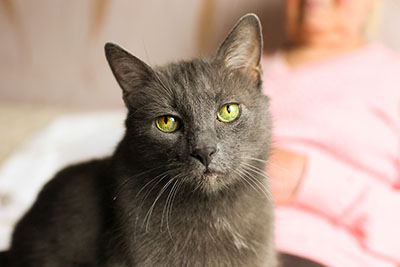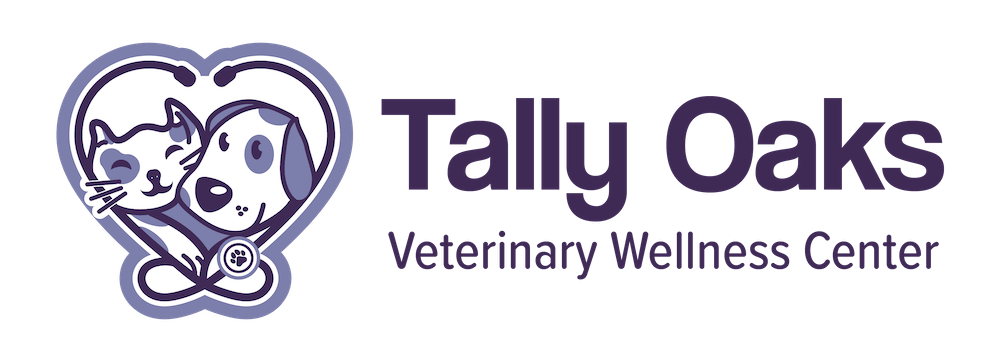 Dogs and cats that are older than seven years of age are considered seniors. During this time, the aging process is starting to affect the internal organs and arthritis may be starting to form in the joints. Here is a list of recommendations we feel are important for older dogs:
Dogs and cats that are older than seven years of age are considered seniors. During this time, the aging process is starting to affect the internal organs and arthritis may be starting to form in the joints. Here is a list of recommendations we feel are important for older dogs:
Keep vaccinations current. As pets age, they are less able to fight off disease on their own. This is the time of their life when vaccinations become even more important. Together, we can look at your pet’s lifestyle and determine which vaccines are right.
Brush your pet’s fur regularly. This can help prevent matted fur, which can become painful. It will also enable you to be able to spot skin infections and skin tumors that may be forming.
Keep toenails clipped as short as possible. Long nails can not only alter a pet’s gait and cause pain, but they can also make it more difficult for them to walk on slick floors.
Keep plenty of fresh water available. Also keep track of how often they are visiting that water bowl and how much water they are consuming. Dogs and cats that have increased water consumption may have diabetes, kidney disease, Cushing’s disease (only in dogs) or a urinary tract issue.
How often should I take my senior pet to the veterinarian?
We recommend that your senior pet be seen every 6 months for a wellness exam. However, if you notice any of the following, they should be seen immediately:
- Significant increase in the amount of water being consumed each day
- Significant increase in the frequency or amount of urination
- Weight gain
- Significant decrease in appetite or not eating for more than 2 days
- Significant increase in appetite
- Repeated vomiting
- Diarrhea
- Constipation or difficulty urinating
- Suddenly urinating or defecating in the home when previously well house trained
- Lameness that lasts more than 2 days, or lameness that switches legs
- Noticeable decrease in vision, especially if suddenly bumping into walls or furniture or you notice the the pupils don’t constrict in bright light.
- Masses, open sores or multiple scabs on the skin that last longer than one week
- Bad breath or excessive drooling
- Increase in the size of the belly
- Increased amount of time spent sleeping
- Hair loss
- Persistent coughing or gagging
- Excessive panting
- Sudden collapse or episodes of weakness
- Inability to chew dry food
- Seizures
To help us keep your senior pet looking and feeling healthy we recommend the following services and diagnostics at least yearly:
 Senior blood work including a complete blood count, chemistry panel and electrolytes, thyroid hormone levels and urinalysis. This will help us identify underlying diseases in order to allow early intervention, providing us with the best shot at successful treatment. Some more common problems in older animals that we are looking for are:
Senior blood work including a complete blood count, chemistry panel and electrolytes, thyroid hormone levels and urinalysis. This will help us identify underlying diseases in order to allow early intervention, providing us with the best shot at successful treatment. Some more common problems in older animals that we are looking for are:
- Hypothyroidism (Dogs)
- Hyperthyroidism (Cats)
- Hyperadrenocorticism (Cushing’s disease) (dogs)
- Chronic kidney disease
- Diabetes
- Liver disease
- Urinary tract infections
Radiographs (x-rays) of the hips and knees to screen for arthritis
Radiographs of the chest to evaluate the size of the heart and to look for any changes in the lungs
Radiographs and ultrasound of the abdomen to look for any evidence of masses (tumors) that we may not be able to feel during our exam.
Blood pressure monitoring. Dogs and cats can get high blood pressure as they age. Just like in people, this makes them more prone to blood clots, problems with the kidneys and sudden blindness.
Eye pressure measurement to screen for glaucoma (increased pressure in the eye).
If we identify any issues with your dog or cat with our diagnostics, we will make sure that you have a clear understanding of what is happening, treatment options, and recommendations for next steps. We know that as your pet ages, not knowing how to keep them comfortable and happy can be stressful. Every member of our staff is here to help you navigate this time in your dog’s life and provide the best care.
Be proactive and call our office for a Senior Pet Consultation.
Some common aging changes include:
- Changes sleep-wake cycle
- Changes in vision
- Appearance of brown spots in the iris
- Decreased sense of smell
- Brittle or fragile nails
- Decreased lung reserve
- Heart or circulatory problems
- Decreased digestion and ability to absorb nutrients
- Loose, less-elastic skin
- Reduced ability to handle stress
- Changes in behavior
We all want to grow old with grace and dignity, and we want the same for our pets. Fortunately, expert understanding of cat health and advances in veterinary medicine mean cats can live longer, better lives than ever before. As your cat’s caregiver, there’s much you can do to keep your cat healthy and happy. We have additional tips for caring for your senior cat.
